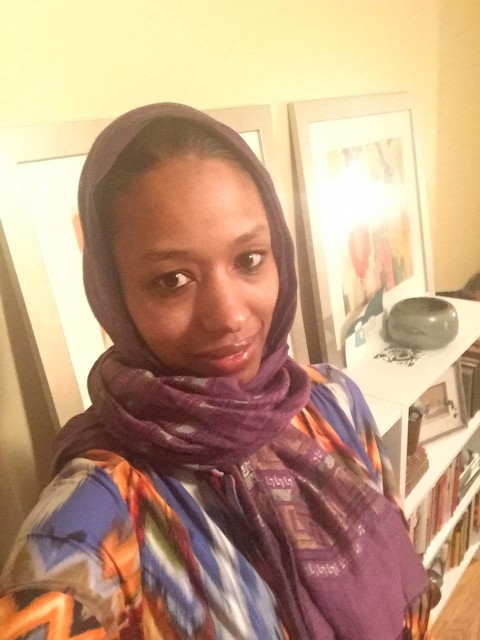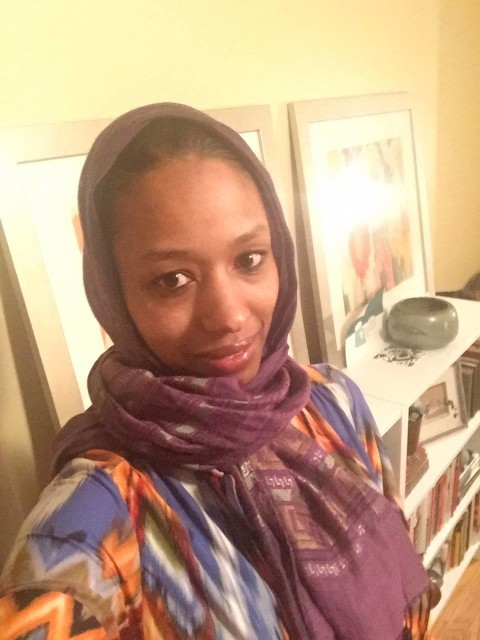
Dr. Larycia Hawkins wearing a hijab
(RNS) Last week, Wheaton College political science professor Larycia Hawkins posted a picture of herself on Facebook. Hawkins was wearing a hijab in solidarity with Muslims. Wheaton, which requires professors to sign a statement of faith, placed Hawkins on administrative leave because her post included the comment that Christians and Muslims “worship the same God.” She will remain on leave while the college investigates the tenured professor.
The news of Wheaton’s decision is shameful. I say this as an alumnus of the college, someone who has even taught a course at Wheaton, and someone who knows Hawkins and the rest of the political science faculty. Put bluntly: I know and love Wheaton and its students. And it’s from this position that I am profoundly disappointed in how Hawkins has been treated.
Wheaton holds a unique place among evangelicals. It seeks to excel academically while maintaining a distinctive evangelical identity.
READ: Wheaton College must decide hijab-wearing prof’s future — and its own
So, I’m not surprised that Wheaton made a public statement responding to the controversy. The college, as an institution, often needs to make clear its positions on theological matters.
But the college erred by putting Hawkins on leave and making this decision public. Correction: It was not an error. It was a disgrace.
Wheaton overreached. Faculty at Wheaton teach there because they support the mission of the college. They sign both a statement of faith and “community covenant” that they hold certain beliefs and will behave in accordance with those beliefs. A tenured professor has spent years teaching at the institution and has been thoroughly vetted as being the type of professor Wheaton wants to compose its faculty.
If any faculty member makes a statement that appears to run counter to the statement of faith, the most likely reason is that he or she does not view it as contradictory. This is, after all, an academic institution where nuance and differences are encouraged.
READ: Do Jews ‘worship the same God,’ Wheaton?
In its statement on Hawkins’ suspension, the college said:
“Wheaton College faculty and staff make a commitment to accept and model our institution’s faith foundations with integrity, compassion and theological clarity. As they participate in various causes, it is essential that faculty and staff engage in and speak about public issues in ways that faithfully represent the College’s evangelical Statement of Faith.”
Did Hawkins make a statement that failed to “faithfully represent” the statement of faith? No. The statement of faith makes no mention of Islam. And to my knowledge, the college had not taken a position on whether Muslims and Christians worship the same God until this week. The trustees and others on campus may have assumed that this was unnecessary to state such a position, but they never bothered to make that position clear.
As Hawkins notes, prominent Christians have said that Christians and Muslims worship the same God. Indeed, her comment referenced Pope Francis’ recent statement on this. The phrase is often invoked during interfaith dialogue. It is a pastoral statement, not a statement on the ontology of God.
In 2011, Yale theologian Miroslav Volf made the claim in his book “Allah: A Christian Response.” It was an argument many evangelicals took seriously. Evangelicalism’s flagship magazine, Christianity Today, interviewed Volf on the question, and more importantly, Wheaton invited Volf to campus to speak on the topic of whether Christians and Muslims worship the same God. Wheaton gave Volf a stage to make his case and answer questions from students.
Wheaton does not endorse every speaker who comes to campus, but one could excuse a professor who borrows a phrase spoken from a theologian Wheaton brought to campus to speak on how Christians should interact with Muslims.
Wheaton has the right to update its statement on beliefs, but at the time Hawkins made her statement, the college was silent on the issue, there were prominent Christian voices who made the same statement, and Wheaton welcomed the most noteworthy proponent to campus. At worst, Hawkins made Wheaton realize that it had failed to make its position clear.
READ: Meet the four types of evangelicals; not all are political (COMMENTARY)
In reaction, Wheaton went beyond stating its beliefs on Islam. It put Hawkins on administrative leave. This is an extraordinary step by the college.
The only other recent case of Wheaton College putting a tenured professor on administrative leave was a professor arrested (and eventually convicted) on charges of child pornography. That’s right: Hawkins is being treated the same as a child pornographer.
Hawkins is not a threat to students. There is no reason to pull her from her classes. She simply made a statement that the college has quickly interpreted as violating its statement of faith. But she’s on leave until she can be given “due process.”
The damage is done. Her reputation in evangelical higher education has been publicly diminished by the college. Wheaton chose to make Hawkins an example of its commitment to orthodoxy, albeit an orthodoxy that Wheaton did not feel important enough to include in any statement until now.
What Wheaton should have done is update its statement of faith to make it clear. Wheaton has a right to state its beliefs and require professors to adhere to those beliefs. What it cannot do is punish (publicly, to boot) a professor for violating a previously unstated belief that neither she, nor any other professor, had been asked to support.
Wheaton has put itself in a difficult position that will be hard to maneuver out of. This is made worse that Hawkins is one of the few women of color at Wheaton. If Wheaton has, in the past, treated other professors with a different process, then it could be facing accusations of violating Hawkins’ civil rights. If there is a record of treating white, male professors with confidentiality and due process but publicly shaming or inventing new punishments for one of the few women of color on the faculty, then this controversy could take a legal turn that the college could not escape.
For now, my thoughts and prayers are with the students and faculty at Wheaton, especially Hawkins. My hope is that Wheaton College administrators and trustees will reverse course. It’s time to treat Hawkins the way that they would want to be treated.
(Tobin Grant is a political science professor at Southern Illinois University and associate editor of the Journal for the Scientific Study of Religion)





